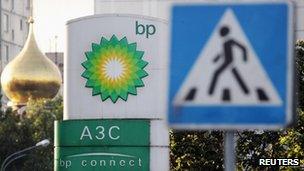Will BP be bruised by Russian bear?
- Published
- comments

As I understand it, the reason there has been a delay in the announcement of BP's sale of its half share in TNK-BP to Rosneft is that the deal is significant enough to require the formal approval of Vladimir Putin.
Which is expected from the president of Russia in the course of today, probably this morning. But oil executives are incredibly superstitious about taking any future event in Russia for granted.
As and when it happens (probably later this morning) this will be more than just a sale. It represents the establishment of a new partnership between BP and Russia's biggest energy company, with - as I mentioned last week - BP acquiring a stake in Rosneft of just under 20% (a big chunk of the sale price, of around $27bn, will be in the form of Rosneft shares).
The transaction should be seen in the context of Rosneft's gradual privatisation and its ambition to be seen as one of the world's most powerful oil companies. In that context, Rosneft wants access to BP's engineering skills, its technology, its financial controls, its management expertise and - perhaps most important as it seeks to raise capital from international investors - its approach to governance.
In spite of all the mud hurled at BP during and since the Macondo oil-spill debacle in the Gulf of Mexico, BP would still be seen by shareholders as a model of transparency and communication compared with most Russian companies - and Rosneft apparently wants a bit of that to rub off on it.
For BP, the rewards - if all goes roughly to plan (ahem) - would be opportunities with Rosneft to tap into Russia's vast energy reserves and the probability that the Rosneft stake will become more valuable as this vast lumbering company becomes more efficient and more highly rated by the global investment community.
On this view of what the deal is all about, BP executives are bound to be invited on to Rosneft's board and executive committees. For me therefore a test of the seriousness and depth of the partnership between the companies will be the precise number of BP people who become Rosneft directors and the structures put in place for sharing knowledge and skills.
All that said, some BP shareholders regard the board as bonkers to be even contemplating hugging this great Russian bear, having been pretty bruised in recent years by skirmishes with BP's current Russian partners, the AAR collective of billionaires who jointly own TNK-BP.
But BP's board believes it was unrealistic to contemplate getting nothing but cash for its enormous Russian asset in any sale; and if BP has to have some kind of stake in Rosneft, it is better to have a bigger stake that confers more influence and (perhaps) the opportunity to account for some of Rosneft's reserves and production in its own reserves and production.
BP is doing a deeply unfashionable thing by sticking with Russia at this juncture. But the smartest investors would probably say that the big rewards come from investing when the world is shouting at you to take the money and run.